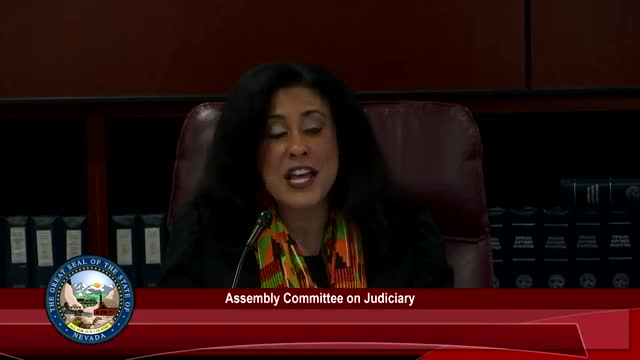Nevada hearing considers making Move Over violations that kill or gravely injure first responders a felony
Get AI-powered insights, summaries, and transcripts
Subscribe
Summary
Assembly Bill 54 would increase penalties for drivers who fail to take legally required precautions when approaching traffic incidents, elevating Move Over violations that cause serious injury or death of a first responder to a category B felony punishable by one to six years in prison and fines of $2,000 to $5,000.
Assembly Bill 54 would increase penalties for drivers who fail to take legally required precautions when approaching traffic incidents, elevating Move Over violations that cause serious injury or death of a first responder to a category B felony punishable by one to six years in prison and fines of $2,000 to $5,000. The bill’s primary presenters, Colonel Patrick Conway, chief of the Nevada Highway Patrol, and Captain Nathan Peterson of the Nevada Patrol, framed the measure as a response to recent roadside fatalities, including Sergeant Michael Abate and Trooper Alberto Felix.
The bill’s backers say stronger penalties will save lives. "This is not about intent. It is about responsibility," Captain Nathan Peterson said during his presentation. He described AB 54 as "a promise to protect those who protect us" and said the proposal targets negligent conduct — drivers who fail to slow down or move over — rather than only willful conduct. Peterson and others told the committee the Move Over law already requires drivers to slow, proceed with caution and avoid adjacent lanes when safe to do so; AB 54 would reclassify negligent violations that result in death or serious injury and add mandatory sentencing guidelines.
The measure drew broad support from law enforcement and first‑responder groups. Mike Cathcart, representing the city of Henderson, the Nevada District Attorneys Association, Las Vegas Metropolitan Police Department, Nevada Police Union, Clark County, the Las Vegas Police Protective Association, towing and trucking groups, and firefighter representatives all testified in favor, saying the bill would provide greater accountability and deterrence. Arlene Felix, the widow of Trooper Alberto Felix, told the committee, "My world shattered when my husband was taken from us," and asked lawmakers to "please pass AB 54. Do it for my husband, Trooper Felix. Do it for Sergeant Abate."
Committee members pressed presenters on the bill’s relationship to existing statutes. Assembly Member Roth noted that reckless‑driving statutes already criminalize conduct that causes death and asked how AB 54 differs. Captain Peterson and Lieutenant Colonel Martin Malesco told the committee the difference is in the mental state the statutes target: reckless‑driving provisions address willful or wanton disregard, while AB 54 is intended to address negligent failures to follow the Move Over law. "The move over law has a number of different things tied to it," Peterson said; "those that fail to do that are neglectful in what their responsibilities are as they approach a traffic incident. That's where the difference lies for us." Malesco added that speed or other intentionally dangerous acts could still be prosecuted under reckless‑driving statutes.
Opponents, including Paloma Guerrero of the Carson City Public Defender's Office and Angela Knott of the Washoe County Public Defender's Office, urged caution. Guerrero argued AB 54 "creates a strict liability situation" that could criminalize accidental conduct — for example, a driver with a medical emergency — and said the conduct sought by supporters is already covered by reckless‑driving law. Knott said the bill "removes the why" from prosecutions and shifts burdens in ways that could send people to prison for accidents; both public‑defender witnesses offered language they said would narrow the bill and said they would withdraw opposition if that amendment were adopted.
Presenters cited national and state statistics during the hearing. Captain Peterson cited a 2023 nationwide figure — 46 first responders killed in struck‑by incidents — and referenced National Highway Traffic Safety Administration reporting showing Move Over laws exist in all 50 states. Presenters also described enforcement challenges: troopers on scene cannot always leave to stop violators, and many enforcement contacts arise only when additional officers are available.
The committee heard emotional testimony from families and first responders and received technical questions from members about application of the statute, data collection and exceptions when drivers cannot safely move over. No committee vote occurred at the hearing; the sponsor and department representatives concluded with requests for committee support and said they remain available for follow‑up questions.
